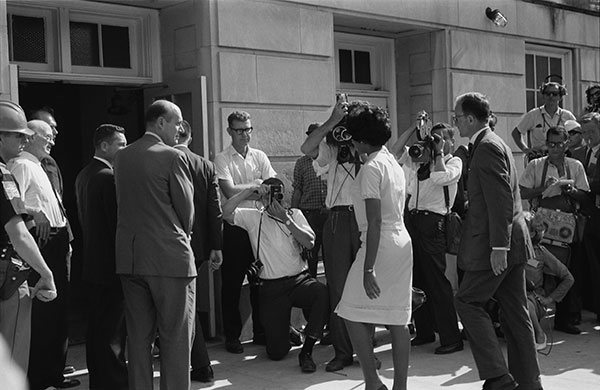

You will study the expressions Don’t like or doesn’t like.




Imagen: Colored university student Viviana Malone. Public Domain. https://upload.wikimedia.org/wikipedia/commons/3/32/Vivian_Malone_registering.jpg?download
Instructions: Read about racism in the US. Look at the expression in bold.
Eventhough many American people don’t like racism and discrimination, they are prevalent throughout the US. They can be felt most strongly in conservative regions of the contry like the South and Midwest, as well as in small towns and rural areas. The groups that are most often discriminated against are African Americans, Hispanic, and Muslims, but smaller minority groups, such as Jew, other immigrant groups, and the LGBT community, bear their share of intolerance as well.
Racism and discrimination in the US. Retrieved and adapted October, 2016 fromhttps://www.internations.org/usa-expats/guide/16295-safety-security/racism-and-discrimination-in-the-us-16290

Instructions: Read the text to do the suggested activity.
Although America is by nature a country of immigrants, US anti-immigrant sentiment is deeply rooted in American history, and continues to the present day. Many white Americans of European, usually Protestant, descent, like to claim that theirs is the one true “American” culture. The reality, of course, paints the picture of a culture that is anything but homogenous. Native Americans lived on the land that is now the United States first, millions of Africans were brought to the US by force to be held in slavery, and people have been immigrating to the US from all around the world, not just western Europe, for centuries. Xenophobia has risen over the past years as the topic of illegal immigration has come to the forefront of American politics. The nation is divided on what to do about the millions of illegal immigrants currently living on US soil. Anti-immigration groups patrol the border, making sure no more prospective immigrants cross over, and racial profiling is used to question the legal status of anyone “foreign-looking". Especially with the instability of the US economy in recent years, some Americans fear that their jobs are being given away to immigrants.
Racism and discrimination in the US. Retrieved and adapted October, 2016 fromhttps://www.internations.org/usa-expats/guide/16295-safety-security/racism-and-discrimination-in-the-us-16290
Instructions: Choose T (true) or F (false) for the following statements.

Instructions: Look at the following information about the expressions don’t like and doesn’t like:
We use the verb like to express that we appreciate something or someone. Examples:
I don’t like green apples.
He doesn’t like vegetables.
They don’t like action books.
I don’t like that British man.
We use don’t like for I, we, you, they.
We use doesn’t like for he, she, it.
| Subject | don’t / doesn’t | like | complement. |
|---|---|---|---|
| I | don’t | like | racism |
| You | don’t | like | practicing discrimination. |
| He | doesn’t | like | xenophobia. |
| The | don’t | like | immigrants. |

Instructions:Unscramble the words to make negative statements with like.

Instructions: Write negative sentences with the following prompts and the verb like.

Instructions: Correct the mistakes in the following sentences.